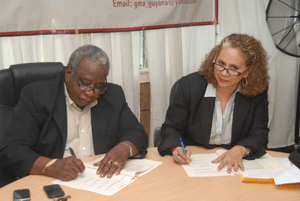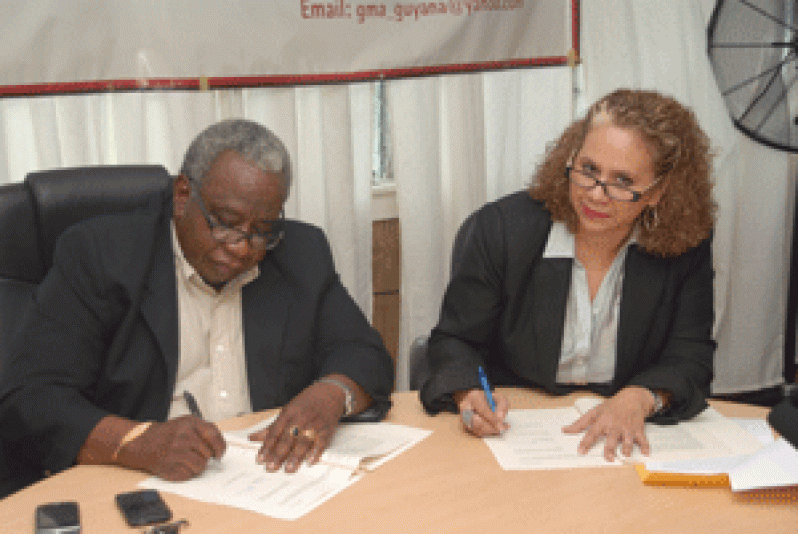IDB providing US$150,000 towards optimising energy efficiency usage
THE Guyana Manufacturing and Services Association (GMSA) and the Inter-American Development Bank (IDB) signed a grant arrangement yesterday, aimed at assisting local companies in the manufacturing and services sectors to make the most efficient use of their energy applications.  Another objective, agreed at the signing in the GMSA Waterloo Street, North Cummingsburg, Georgetown office, is for the targeted groups to employ the most effective methods of energy conservation.
Another objective, agreed at the signing in the GMSA Waterloo Street, North Cummingsburg, Georgetown office, is for the targeted groups to employ the most effective methods of energy conservation.
The GMSA, prior to yesterday, has been advocating for better energy management at various levels of government (including the National Competitiveness Strategy Unit (NCSU), in pursuit of its mandate as a business support organisation and as part of its own interventions with local and international funding and business development entities.
This new arrangement is just one of the initiatives employed by the GMSA to access funding and global expertise to ensure that local enterprises could be strengthened and that their products can compete locally and internationally on the markets.
GMSA President Mr. Clinton Williams, in his remarks expressed gratitude to the IDB for providing some 60 percent (US$150,000) of the funds required for the project and ensuring that the full scope of it is accomplished with the best expertise available.
He also lauded the Government of Guyana for being supportive, by making sure that all the perceived bottlenecks were amicably removed.
LONG RECOGNISED
Williams said that the GMSA has long recognised that the question of energy availability, reliability and costs ranks highest among the constraints preventing any desirable expansion and growth in the manufacturing sector.
“The project provides an initial basis for the formulation and implementation of mechanisms that would contribute to the resolution of problems associated with in-company energy utilisation, starting, of course, with private sector businesses, themselves,” he asserted.
Further, he said the intention is to come up with techniques that will optimise utilisation of the energy sources, thus creating standards and practices which can serve as bases for continued reduction in losses and reduced costs to both the consumer and the provider.
Country Representative, Ms. Sophie Makonnen, agreed that the accomplishment is an important milestone in the support that the IDB is providing to Guyana, in the quest of better energy resources solutions.
She said the scheme is being financed by the IDB branch called Multilateral Investment Fund (MIF), which specialises in making small loans available to entrepreneurs in order for them to enhance their businesses.
Makonnen pointed out that the GMSA will also be providing some of the funds for the purpose and it will significantly lower the cost of energy consumption for the manufacturing sector in Guyana.
She assured of the IDB’s assistance for similar and other projects, but the one to which she affixed her signature is designed to address three distinct, though unrelated components of energy efficiency techniques – energy conservation, energy consumption, alternative energy and sources.
Additionally, it will address, in the short term, lighting, heating and cooling equipment and accessories, motorised drives and other major energy-consuming assets.
TWO COMPONENTS
It is divided into two components. One is an energy-efficient rating study, which would establish a data baseline showing consumption, utilisation and cost patterns for various equipment and accessories across specific sub-sectors and the other the completion of an energy audit and study which would involve live in-plant measurements and monitoring of electrical assets, so as to conduct variance analyses between actual and rated consumption levels, with the ultimate determination being the type of corrective actions to be taken, whether technological, structural or procedural in raising energy efficiencies.
A reputable, locally based partner, functioning as the principal agent, will manage the project in tandem with the consultants from the Caribbean Region. Five local companies have been identified to serve as pilots and the findings from their studies will provide the baselines for the implementation of energy efficiency methodologies for similar enterprises across the country.
The energy-efficiency rating survey will be conducted in each pilot company, the first stage to gather baseline data on energy costs and usage over the period of about four months and the second stage comprising the energy audit and study involving live measurements taken from assets and components which will determine corrective actions/equipment needed to improve operational efficiencies over a six- month period.
The third stage will involve promotion of the findings of the first two stages among the wider industrial public through media workshops and sessions.



.jpg)









